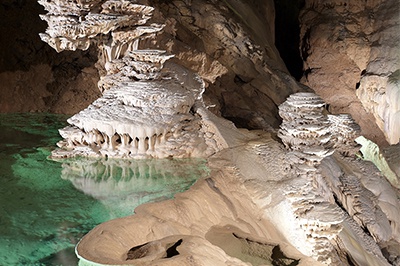 Underground France
Underground France Looking for hidden gems of the French heritage
France... Known for its monuments, hilly landscapes, vineyards, unequalled beaches. But did you know that the country also has genuine treasures hidden underground? Let us guide you six feet under.
The Lascaux cave
Located in the Périgord (Dordogne region), the Lascaux Cave is made of underground rooms and galleries of over 30 m of ascending elevation. Its walls have supposedly been painted in 18,000 BC! When you see the quantity and quality of murals, you undersand that the famous cave deserves its nickname of "Prehistoric Sistine Chapel". It is part of the UNESCO World Heritage and is now closed to the public due to conservation concerns. Visitors may now appreciate the work of Humanity's first artists in Lascaux II, the exact replica of the site.
The Aquarium of Paris
You may have heard of the Aquarium of Paris. But did you know that the 3,500 m2 site is built entirely underground? As the first aquarium in the world, built in 1867, it is supposed to have inspired Jules Verne for his famous "Twenty thousand leagues under the sea". Hidden under the gardens of the Trocadéro, a stone's throw away from the Eiffel Tower, it now hosts 500 animal species from the coastlines of metropolitan and oversea France.
The Jonas troglodyte site in Saint-Pierre-Colamine
In the Puy-de-Dôme region, an entire city is hidden underground: the Jonas troglodyte site in Saint-Pierre-Colamine. Divided in four floors, you will discover over 60 rooms connected by staircases carved directly in the cave walls. In the chapel, built during the Romanesque period, you will admire impressive frescoes from the 12th century.
The monolithic church of Saint-Émilion
Let's now go to the Gironde region, in a city mostly known for its tasteful wine, the Saint-Émilion region. This is where the biggest underground church in Europe has been built, in the late 11th century. This church, of oriental influence, hides many secrets: you can find the statue of a Franciscan monk of mysterious identity, lead sarcophaguses and a water source regarded as miraculous.
The chasm of Padirac
Churches, frescoes and other art masterpieces can't compete with what nature is capable of. The chasm of Padirac, in the Lot region, is one of the most visited tunnel in Europe. The chasm itself is open-air. To explore the caves around, take a rowboat: the beauty of the stalactites, the magnificence and the mysterious aura of the landscape will take your breath away.
Photo credits: ©Dominique VIET and Cochise ORY / Office de tourisme de la Vallée de la Dordogne

